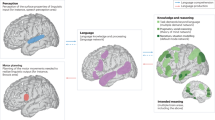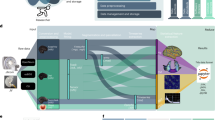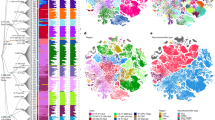Abstract
Children can learn aspects of the meaning of a new word on the basis of only a few incidental exposures and can retain this knowledge for a long period—a process dubbed 'fast mapping'1–8. It is often maintained that fast mapping is the result of a dedicated language mechanism, but it is possible that this same capacity might apply in domains other than language learning. Here we present two experiments in which three- and four-year-old children and adults were taught a novel name and a novel fact about an object, and were tested on their retention immediately, after a 1-week delay or after a 1-month delay. Our findings show that fast mapping is not limited to word learning, suggesting that the capacity to learn and retain new words is the result of learning and memory abilities that are not specific to language.
This is a preview of subscription content, access via your institution
Access options
Subscribe to this journal
Receive 51 print issues and online access
$199.00 per year
only $3.90 per issue
Buy this article
- Purchase on Springer Link
- Instant access to full article PDF
Prices may be subject to local taxes which are calculated during checkout
Similar content being viewed by others
References
Carey, S. & Bartlett, E. Child Lang. Dev. 15, 17–29 (1978).
Carey, S. in Linguistic Theory and Psychological Reality (eds Halle, M., Bresnan, J. & Miller, G. A.) 264–293 (MIT Press, Cambridge, Massachusetts, 1978).
Markman, E. M. Categorization and Naming in Children: Problems of Induction 1–250 (MIT Press, Cambridge, Massachusetts, 1989).
Baldwin, D. A. Child Dev. 62, 875–890 (1991).
Dickinson, D. K. Appl. Psycholing. 5, 359–373 (1984).
Dollaghan, C. A. J. Speech Hear. Disord. 52, 218–222 (1987).
Heibeck, T. H. & Markman, E. M. Child. Dev. 58, 1021–1034 (1987).
Rice, M. L., Buhr, J. C. & Nemeth, M. J. Speech Hear. Disord. 55, 33–42 (1990).
Newport, E. Cogn. Sci. 14, 11–28 (1990).
Chomsky, N. Rules and Representations 1–299 (Blackwell, Oxford, 1980).
Pinker, S. The Language Instinct 1–494 (Morrow, New York, 1994).
Curtiss, S. in Interaction in Human Development (eds Bornstein, M. & Bruner, J.) 105–137 (LEA, Hillsdale, New Jersey, 1989).
Neville, H. J. in Brain Maturation and Cognitive Development (eds Gibson, K. R. & Peterson, A. C.) 355–380 (Aldine de Gruyter, Hawthorne, New York, 1991).
Bloom, P. & Kelemen, D. Cognition 56, 1–30 (1995).
Markman, E. M. & Wachtel, G. F. Cogn. Psychol. 20, 121–157 (1988).
Author information
Authors and Affiliations
Rights and permissions
About this article
Cite this article
Markson, L., Bloom, P. Evidence against a dedicated system for word learning in children. Nature 385, 813–815 (1997). https://doi.org/10.1038/385813a0
Received:
Accepted:
Issue Date:
DOI: https://doi.org/10.1038/385813a0
This article is cited by
-
Modeling Learning in Doubly Multilevel Binary Longitudinal Data Using Generalized Linear Mixed Models: An Application to Measuring and Explaining Word Learning
Psychometrika (2017)
-
The problem of lexical innovation
Linguistics and Philosophy (2016)
-
First Words Learning: A Cortical Model
Cognitive Computation (2010)
-
Broca's area and the language instinct
Nature Neuroscience (2003)
Comments
By submitting a comment you agree to abide by our Terms and Community Guidelines. If you find something abusive or that does not comply with our terms or guidelines please flag it as inappropriate.



